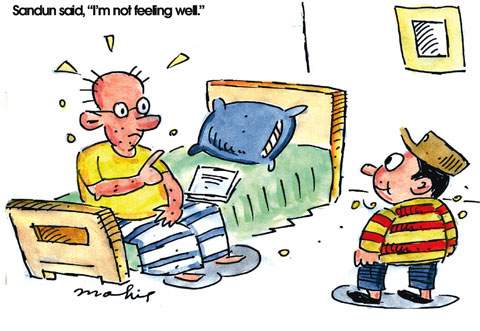Direct and Indirect speech exercise for class 8, 9, 10
PRACTICE EXERCISE: 1
Direct and Indirect speech exercise for class 8
Q1. Change the following into indirect speech:
- He says, ‘I am going soon.”
- She said sadly, ‘I have forgotten to lock the door.”
- The crocodile said to the monkey, ‘My wife wants to eat your heart.” “My heart is in the tree,’ said the monkey.
- You have kept the rule but broken its spirit, the judge said to the lawyer.
- The teacher said to the students. The students will not go unless the work is over.’
- He said to his friend, ‘I have plans to set up my own industry.” ‘I don’t have any such plans and I depend on my job,’ stated his friend.
- Jesus said, “You always have the poor with you.
- ” She says, ‘I am tired, yet I will try to do well.”
‘I don’t believe her,’ says the coach. - He said, ‘Nancy, let us put our Christmas presents away and keep them awhile. They are too nice to be used just at present.’
- The children said to me, “Sir, we went on a picnic last year.’
- The teacher said, ‘The sun rises in the east.”
- He said to us, ‘I do not know how to write an essay.”

REPORTING QUESTIONS The reporting verb most often used for reporting wh-questions is ask. Questions may also be reported more formally using enquire or inquire.
The teacher said to him, “Why are you late?” (direct)
The teacher asked him why he was late. (indirect)
He said to her, ‘How have you been able to do all this?” (direct)
He asked her how she had been able to do all that. (indirect)
The teacher said to her, ‘Where are you going?” (direct)
The teacher enquired of her where she was going. (indirect)
When we report a yes/no question, we use an if-clause beginning with the conjunction if or a whether-clause beginning with the conjunction whether. We use if when the speaker has suggested one possibility that may be true:
She asked him, ‘Do you know swimming?” (direct)
She asked if he knew swimming. (indirect)
We use whether when the speaker has suggested one possibility but has left open the question of other possibilities:
He said to him, ‘Do you still live there or at your own house?” (direct)
He asked whether he still lived there or at his own house. (indirect)
PRACTICE EXERCISE: 2
Direct and Indirect speech exercise for class 8, 9, 10
Q2. Change the following questions into indirect speech:
- Where have you been all these years?” he said to his friend.
- The teacher said to the pupils, “What is the shape of the earth?”
- He said to his friend, “How shall we do this big task?”
- Why were you absent yesterday?” the teacher said to me.
- Why have you come late?” he shouted at his colleague.
Who are you to question me?” his colleague shot back. - The teacher said, “Students, do you want to go on a tour?”
- The student said to the teacher, ‘Sir, may I get in?’
- Sheela said to Leela, ‘Have you ever been to Chennai?”
- The students said to one another, ‘Is mathematics really easy?”
- How much money do you want?” he said to his son.
- ‘What help do you expect from me?’ I said to my friend.
- The passenger said to the clerk, ‘When will the next train leave for Hyderabad?”
- Manul said, ‘Parul, where did you keep the book?”
- I said to John, ‘To whom have you given the new bat?’
- The teacher said to the students, ‘Why did you leave the class?”
- He said to her, ‘How much work is left?’
REPORTING ORDERS, REQUESTS, ADVICE, AND INTENTIONS IMPERATIVE SENTENCES)

We can report order, request, or advice of someone else by using a to-infinitive clause after a reporting verb such as tell, order, request, command, advise, etc. The person being addressed, who is to perform the action, is mentioned as the object of the reporting verb.
The imperative mood is thus changed to the infinitive:
He said to his servant, ‘Go and bring some food.’ (direct)
He ordered his servant to go and bring some food. (indirect)
He said to him, ‘please help me.’ (direct)
He requested him to help him. (indirect)
He said to him, ‘Take exercise daily.’ (direct)
He advised him to take exercise daily. (indirect)
PRACTICE EXERCISE: 3
Direct and Indirect speech exercise for class 8, 9, 10
Change the following into indirect speech:
- He said to his servant, ‘Switch off the light before going to bed.”
- The master said to the servant, “Go and bring a cup of tea at once.
- The policeman said to the man, ‘Tell me your name and address.’
- The child said, ‘Take me to my house, please.’
- Please wait here till I return,’ he said to her.
- The beggar said, ‘Give me something to eat.’
- ‘Abhijit, do not forget tomorrow’s match,” said Simran.
- Write fast,’ the examiner said, ‘don’t waste your time.’
- The mother said, “Daughter, dress yourself properly before going to the party.
- Father said to his children, ‘Do not go near the fire.
- The beggar said to the man, “Kindly give me a rupee.’
- Dick said to me, ‘Don’t trust that rascal.”
REPORTING EXCLAMATIONS AND WISHES
We can report exclamations and wishes by a verb expressing exclamation or wish:
He said, “Alas! He is no more.”(direct)
He exclaimed with sorrow that he was no more. (indirect)
He said, ‘Goodbye, Sunil!’ (direct)
He bade Sunil goodbye. (indirect)
She said, ‘Good morning, mummy.’ (direct)
She wished her mummy good morning. (indirect)
The coach said, ‘Bravo, you have done well.’ (direct)
The coach applauded the players saying that (indirect)
they had done well.
PRACTICE EXERCISE: 4
Direct and Indirect speech exercise for class 8, 9, 10
Change the following sentences into indirect speech:

- He cried. ‘Oh! How weak I feel.’
- ‘What a fine weather!’ said she.
- The teacher said, ‘How intelligent she is!’
- ‘How wonderful the house is!’ said the man.
- The old man said, ‘Oh God! How great You are!’
- ‘I am ruined!’ cried the student who had failed.
- In his agony he cried, “Alas! I have nursed you all my life and now I die here helpless in sight of you.’
- He said, ‘What a fine horse! What a saddle!’
- He said, ‘Hurrah! Our team has won the match.’
- I am a broken man with no wealth and none to care for me!’ said the old man.
- He said to me, ‘How clever you are!’
- How kind of you to offer me this job!’ said he.
CHANGING INDIRECT SPEECH INTO DIRECT SPEECH
Having understood the process of conversion of direct speech into indirect speech, the conversion of indirect into direct speech presents no difficulties. See the following examples carefully:
He assured me that his father would certainly help me. (indirect)
My father, will certainly help you,’ said he to me. (direct)
He disclosed that the result has already been declared. (indirect)
The result has already been declared,” said he. (direct)
The Prime Minister advised his countrymen to remain vigilant. (indirect)
The Prime Minister said, ‘Countrymen, remain vigilant.” (direct)
She requested her father to let her go to meet her friend. (indirect)
She said, ‘Please father, let me go to meet my friend.’ (direct)
He enquired of Akil why he had not attended his birthday party. (indirect)
He said to Akil, “Why didn’t you attend my. birthday party? (direct)
She asked him when he would visit his uncle who had been hospitalised. (indirect)
She said to him, “When will you visit your uncle who has been hospitalised?” (direct)
He asked her if she was going to watch a movie. (indirect)
He said to her, ‘Are you going to watch a movie?” (direct)
The beggar asked me whether I would give him ten rupees. (indirect)
The beggar said to me, “Will you give me ten rupees?” (direct)
She cried with joy that she had won the match. (indirect)
She said, ‘Hurrah! I have won the match.” (direct)
The king warned that their enemy was too strong to be defeated. (indirect)
The king said, ‘Behold! Our enemy is too strong to be defeated.” (direct)
PRACTICE EXERCISE: 5
Direct and Indirect speech exercise for class 8, 9, 10
Change the following sentences into direct speech:
- He boasted that he could do that task easily.
- The Minister said that the country was going through a drought situation and that everyone should work to ease the situation.
- The boy told his father that he had taken up the examination in order to become a doctor.
- The man ordered his servant to bring some vegetables from the market.
- He requested his father to give him money to buy a good bat.
- The teacher advised the students not to fight.
- The passenger inquired of the station-master when the next train for Hyderabad would leave.
- The customer asked the shopkeeper how much money he would have to pay for the shirt.
- He asked his brother whether he would go to the market and buy some books.
- Vakil enquired of Sunil whether his teacher had finished the syllabus.
- The audience exclaimed that the drama was wonderful.
- Dick regretted that it was very foolish of him to listen to his friend’s advice.
- She regretted that he had not attended the school.
for more tips and tricks follow is on Instagram
Contact us here if you are looking for a tutor for online, offline or hybrid classes in delhi.



3 Comments on Direct and Indirect speech exercise for class 8, 9, 10